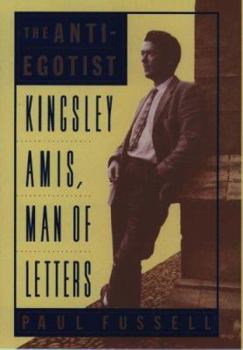The Anti-Egotist: Kingsley Amis, Man of Letters
Select Format
Select Condition 
Book Overview
"Fussell is a wonderful writer," according to The Washington Post Book World, "at once elegant and earthy." With such books as Wartime and The Great War and Modern Memory, he established a reputation as an incisive critic with a razor-tipped pen. Now Paul Fussell turns his attention to one of his own literary heroes, a man of similar acidic wit, Kingsley Amis.
In The Anti-Egotist, Fussell captures the essence of Amis as a man of letters--"a serious critic," as John Gross writes, "operating outside the academic fold." Part biography, part critical appraisal, The Anti-Egotist traces the influences that have shaped Amis's writing, ranging from his schooldays through military service to university teaching, as he emerged as a novelist, poet, and essayist. By drawing our attention to the details first of Amis's life, then of his writing, Fussell reveals the profound moral sense that expresses itself so wonderfully in Amis's fiction and criticism. He mixes affection with insight as he paints a highly personal portrait of Amis as writer who despises self-promotion in all its forms, savaging the world's show-offs and blowhards with a particularly sharp-toothed bite. Amis's criticism, too, shook the British literary world with his "no-nonsense, can-the-bullshit tone," restoring skepticism and honesty to postwar English writing. Fussell guides us through Amis's immense output--portraying him as a book reviewer, custodian of language, gastronomic critic, anthologist, and poet--showing how his overriding concern is always for the public, deriding pretensions that come at a cost to the audience. And the power of Amis's writing, from his humor to his deft characterization, rings through in page after page of Fussell's accurate and evocative assessments.
In recent years, Kingsley Amis has drawn considerable fire, thanks to his outspoken conservative opinions; many critics see him as little more than a crusty old curmudgeon. In The Anti-Egotist, Paul Fussell does the reading public a double favor in restoring the reputation of this important writer: he effortlessly captures the literary virtuosity that lifted Amis to fame, and he reveals the moral convictions that make this seeming curmudgeon more relevant than ever.
In The Anti-Egotist, Fussell captures the essence of Amis as a man of letters--"a serious critic," as John Gross writes, "operating outside the academic fold." Part biography, part critical appraisal, The Anti-Egotist traces the influences that have shaped Amis's writing, ranging from his schooldays through military service to university teaching, as he emerged as a novelist, poet, and essayist. By drawing our attention to the details first of Amis's life, then of his writing, Fussell reveals the profound moral sense that expresses itself so wonderfully in Amis's fiction and criticism. He mixes affection with insight as he paints a highly personal portrait of Amis as writer who despises self-promotion in all its forms, savaging the world's show-offs and blowhards with a particularly sharp-toothed bite. Amis's criticism, too, shook the British literary world with his "no-nonsense, can-the-bullshit tone," restoring skepticism and honesty to postwar English writing. Fussell guides us through Amis's immense output--portraying him as a book reviewer, custodian of language, gastronomic critic, anthologist, and poet--showing how his overriding concern is always for the public, deriding pretensions that come at a cost to the audience. And the power of Amis's writing, from his humor to his deft characterization, rings through in page after page of Fussell's accurate and evocative assessments.
In recent years, Kingsley Amis has drawn considerable fire, thanks to his outspoken conservative opinions; many critics see him as little more than a crusty old curmudgeon. In The Anti-Egotist, Paul Fussell does the reading public a double favor in restoring the reputation of this important writer: he effortlessly captures the literary virtuosity that lifted Amis to fame, and he reveals the moral convictions that make this seeming curmudgeon more relevant than ever.
Format:Hardcover
Language:English
ISBN:0195087364
ISBN13:9780195087369
Release Date:September 1994
Publisher:Oxford University Press, USA
Length:224 Pages
Weight:0.90 lbs.
Dimensions:0.9" x 5.7" x 8.7"
Customer Reviews
2 ratings
Remarkable book
Published by Thriftbooks.com User , 22 years ago
"For all the sometimes rowdy comedy attending Amis's depictions of meanness, his understanding of its psychology is complicated and serious. It is, if funny, also immoral, so little and minimal, practiced by wee men only. And it betrays neurosis, implying constant "paranoid" watchfulness lest one be had. It keeps one on a constant stretch of attentive calculation, and this finally becomes a substitute for thought, as well as replacing an objective interest in things outside oneself." "I feel STRETCHED", Bilbo Baggins after having the One Ring for a while.
Essential for Amis fans
Published by Thriftbooks.com User , 26 years ago
I had to have this one - an intersection of two writers I've admired for some time. Fussel is probably the ideal person to write such an appraisal. As mentioned above, the lack of critical theoryspeak is most welcome. The interpretation of Amis as a moral satirist (which isn't a category that you see very much) provides a useful key to most of his work (fiction, poetry, and prose alike.) If you're a fan of the work, you'll enjoy this - it's like having a chance to sit down across from an intelligent, perceptive reader who likes the same things you do.






